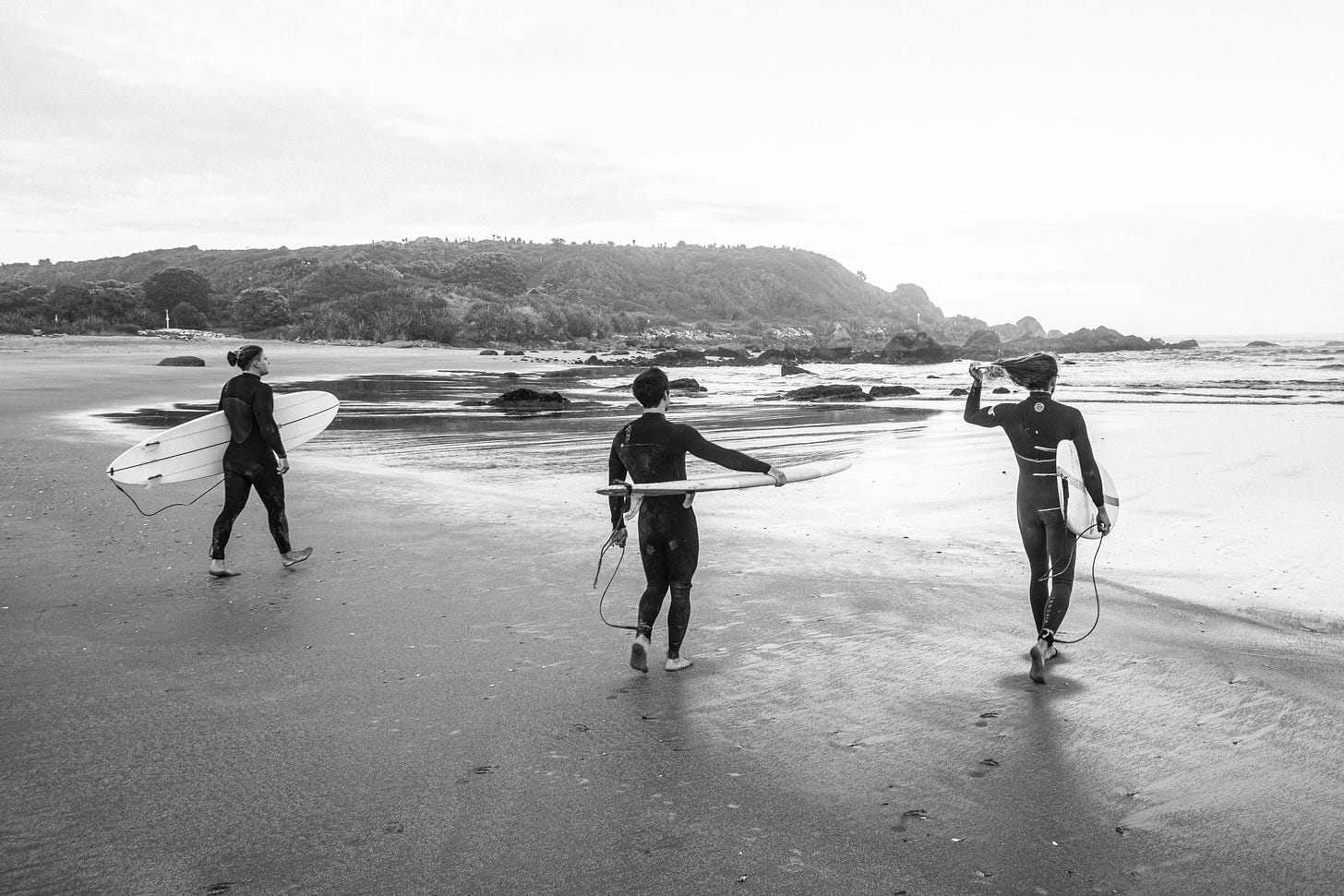Non è un passo indietro.
Immagina ora di cavalcare le opportunità e le difficoltà come se fossero delle onde, di oltrepassarle andandoci ancora più a fondo, e di entusiasmarti, piuttosto che deprimerti, nel vederle arrivare. Ora, preferiresti una vita in acqua piatta, prendendo il sole su una tavola che non sai quanto sia maneggevole e veloce, o preferiresti cavalcare un’onda con la piena consapevolezza della tavola che hai sotto i piedi e lasciandoti la schiuma alle tue spalle? Se hai scelto la seconda, sappi che è stimolante, ma che passerai anche una serie di frullate in acqua salata prima di riuscirci.

La semplicità di una vita nuova
Westport, Febbraio 2025.
Mi sveglio. Alla mia sinistra, Valerie riposa pacifica come non l'ho mai vista negli ultimi due anni. Dormiamo in tenda da settimane: prima perché attraversavamo la Nuova Zelanda in bicicletta, ora perché nell'ostello dove alloggiamo preferiamo usare un caravan come ufficio e la tenda come abitazione. Nel nostro nomadismo, amiamo mantenere una certa stanzialità, così la tenda diventa il nostro rifugio, uno strumento semplice ma prezioso.
Mi volto verso destra, apro la zip e osservo il cielo. Sono settimane che non controllo le previsioni sul telefono. Che differenza farebbe? Percorro i pochi metri di giardino che mi separano dalla cucina e, dopo una colazione lenta e gustosa, inizia la giornata lavorativa.
L'organizzazione dell'ostello è semplice ed efficace: i volontari alloggiano gratuitamente e ricevono lezioni di surf in cambio di qualche ora di lavoro quotidiano. Su un tabellone bianco è disegnata la mappa delle stanze, dove con un pennarello rosso si evidenziano quelle da preparare per i nuovi ospiti. Oltre al rifacimento dei letti, c'è chi si occupa della lavanderia, dei bagni, dei rifiuti o della preparazione delle pizze per cena. Il sistema è collaborativo: quando qualcuno finisce il proprio compito, va ad aiutare gli altri. Iniziamo e finiamo insieme, e se qualcuno è più stanco del solito non è un problema, siamo tutti diversi e il nostro obiettivo comune è completare il lavoro il prima possibile per andare a surfare.
Tornare indietro, è davvero un problema?
Westport, Aprile 2025.
Mentre rifaccio i letti, ripenso agli anni passati. Le persone si sorprendono sempre quando scoprono che ero fisioterapista, che coordinavo un piccolo dipartimento e che ho trascorso un anno in laboratorio per sviluppare la mia tesi magistrale. Oggi rifaccio letti, pulisco bagni e faccio il bucato, e in tutto questo c’è una profonda nota di serenità, ed è proprio questa che stupisce: il senso di pace nel “tornare indietro”. Non lo nego, mi piacerebbe tornare a fare il lavoro che facevo prima mentre viaggio, ma le possibilità sono spesso diverse dai desideri, e accettarle e navigarle in base alle proprie priorità mi ha aperto un mondo da scoprire.
Questo concetto del “tornare indietro” mi fa riflettere; rappresenta la discesa da una scala dove ogni gradino simboleggia un successo sociale: la laurea, il primo impiego, la promozione, il lavoro autonomo, forse un'azienda propria, una posizione manageriale, lo stipendio crescente, l'auto, la casa. Parallelamente, sul piano personale, c'è la progressione delle relazioni: l'innamoramento, la coppia, il matrimonio, i figli, la casa di proprietà.
Non ho nulla contro questo modello di vita, sono felice per chi trova realizzazione in questa “ascesa sociale”. Il problema sorge quando non è ciò che desideriamo veramente, o quando facciamo scelte irreversibili che non ci appagano, o quando raggiungiamo un obiettivo apparentemente gratificante scoprendo che il nostro benessere non dipende dalla carriera o dalle altre scelte sopraelencate.
La mappa delle possibilità
Da quando ho realizzato come alcune scelte di vita fossero legate più a questo modello di crescita sociale che alla realizzazione personale, ho iniziato a vedere gli scalini trasformarsi in una mappa di possibilità: tutte sullo stesso piano, navigabili in qualsiasi momento della vita secondo desideri e necessità. A volte, rifare letti e occuparmi di mansioni semplici si è rivelato gratificante; in altri momenti, lavorare con un team di professionisti per migliorare la qualità della vita delle persone è stato straordinario.
Non siamo il nostro lavoro, siamo persone che spendono tempo lavorando, a volte più di quello che desideriamo. Investiamo molto tempo in esso, e per questo credo sia fondamentale condividere e trovare le soluzioni ideali per far sì che questo tempo diventi un investimento per il nostro benessere, piuttosto che un modo per pagare i nostri debiti o proseguire in una carriera che non ci appartiene. Il ruolo che ricopriamo può darci più o meno soddisfazione, contribuendo a un livello di realizzazione personale che evolve nel tempo. Sarà pur sempre un cliché, ma l'unica costante nella vita è il cambiamento. Perché non applicarlo anche nelle nostre scelte personali, siano esse lavorative o relazionali? La flessibilità mentale, come ho imparato da clinico, è la chiave per superare le difficoltà, l'acceleratore che ci permette di saltare gli ostacoli e goderci i momenti sereni tra le sfide. Perché tutti soffriamo, tutti affrontiamo difficoltà: è il modo in cui le viviamo che determina la nostra serenità.
Domande per il lettore
Perché a volte è così difficile cambiare la forma di una relazione o di un impiego lavorativo?
Ti sei mai chiesto qual è il costo delle tue scelte, cosa stai ottenendo e perché lo stai facendo?
Una cosa che sto imparando ora con il surf è che la fretta è una pessima consigliera. Ogni onda è differente, quindi è meglio non copiare gli altri. Ognuno potrebbe trovarsi sia nel posto giusto che in quello sbagliato, ma lo si potrà scoprire solo quando l'onda si formerà. Meglio allora fermarsi, prendere un respiro, capire la direzione della corrente e la forza dell'onda, scegliere una direzione e infine provare a cavalcarla.
In sintesi: non esiste una scala sociale che garantisca la felicità eterna, ma solo la libertà di scegliere il proprio posto sulla mappa delle possibilità, in un viaggio che muta e affronta sfide indipendentemente dal percorso scelto.



